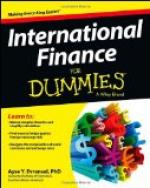In the case of a nation the process of specialization has not, for obvious reasons, gone nearly so far. Every country does a certain amount of farming and of seafaring (if it has a seaboard), and of manufacturing. But the tendency has been towards increasing specialization, and the last results of specialization, if carried to its logical end, are not nice to forecast. “It is not pleasant,” wrote a distinguished statistician, “to contemplate England as one vast factory, an enlarged Manchester, manufacturing in semi-darkness, continual uproar and at an intense pressure for the rest of the world. Nor would the continent of America, divided into square, numbered fields, and cultivated from a central station by electricity, be an ennobling spectacle."[7]
It need not be said that the horrible consequences of specialization depicted by Dr. Bowley need not necessarily have happened, even if its effects has been given free play. But the interesting point about his picture, at the present moment, is the fact that it was drawn from the purely economic and social point of view. He questioned whether it was really to the advantage of a nation, regarding only its own comfort and well-being, to allow specialization to go beyond a certain point. It had already arrived at a point at which land was going out of cultivation in England, and was being more and more regarded as a park, pleasure ground and sporting place for people who made, or whose forbears had made, fortunes out of commerce and finance, and less and less as a means for supplying food for our workers, and raw material for our industries. The country workers were going to the new countries that our capital was opening up, or into the towns to learn industrial crafts, or taking services as gamekeepers, grooms or chauffeurs, with the well-to-do classes who earned their profits from industry or business. Even before the war there was a growing scarcity of labour to grow, and harvest, even the lessened volume of our agricultural output. Dr. Bowley’s picture was far from being realized and even if the process of specialization had gone on, it may be hoped that we should have had sense enough to avoid the blackest of its horrors.
Then came the war, which went far to undermine the great underlying assumption on which the free interchange of capital among nations and the consequent specialization that proceeded from it, was taken to be a safe and sound policy. This assumption was in effect, that the world was civilized to a point at which there was no need to fear that its whole economic arrangements would be upset by war. We now know that the world was not civilized to this point, and is a very long way from being so, that the ultimate appeal is still to “arms and the man,” and that we have still to be careful to see that our trade and industry are carried on in such a way as to be least likely to be hurt if ploughshares have suddenly to be beaten into swords. At first sight, this is a somewhat




